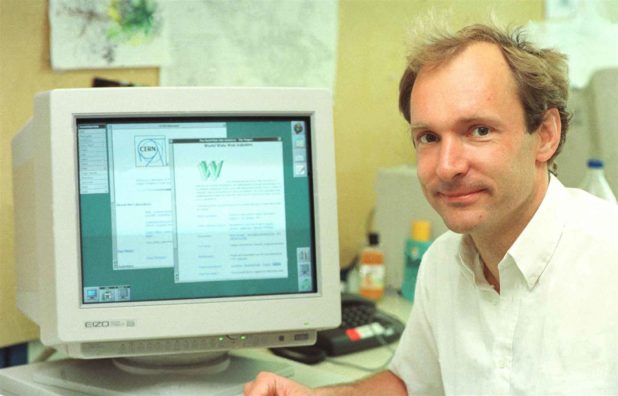Andrew Anglin
Daily Stormer
March 12, 2018
It is going to happen.
Every non-Jew in the industry is calling for it now. The public is demanding it. Alex Jones is all up on it.
And Donald Trump knows that without the ability for his own supporters to organize on the internet, he loses a whole lot of power and influence. I think all right-wingers in the government understand this.
And the whole Russian conspiracy gibberish gives the perfect pretext for the government to get involved with the tech industry and tell them they do not have a right to organize to silence the free speech of American citizens.
Sir Tim Berners-Lee, inventor of the world wide web, has called for large technology firms to be regulated to prevent the web from being “weaponised at scale”.
“In recent years, we’ve seen conspiracy theories trend on social media platforms, fake Twitter and Facebook accounts stoke social tensions, external actors interfere in elections, and criminals steal troves of personal data,” Berners-Lee wrote in an open letter marking the 29th anniversary of his invention.
These problems have proliferated because of the concentration of power in the hands of a few platforms – including Facebook, Google, and Twitter – which “control which ideas and opinions are seen and shared”.
“What was once a rich selection of blogs and websites has been compressed under the powerful weight of a few dominant platforms,” said the 62-year-old British computer scientist.
These online gatekeepers can lock in their power by acquiring smaller rivals, buying up new innovations and hiring the industry’s top talent, making it harder for others to compete, he said.
Yeah, that is the thing.
Their power is already locked in because they’ve already bought all of the smaller rivals. And even the smaller rivals that haven’t been bought can be bullied very easily with threats of denial of various services, as was evidenced by the campaign to remove Daily Stormer from the internet completely.
First it was Godaddy and Google, then a whole list of smaller registrars.
And all types of different services.
The alleged capitalists (and communists) want to come out and scream about “MUH PRIVATE COMPANIES HAVE A RIGHT TO DO BUSINESS WITH WHO THEY CHOOSE,” but what you have is effectively an oligopoly of allied conspirators who are pushing a political agenda.
And the DS situation PROVED THAT BEYOND ANY DOUBT.
Honestly, it was stupid for them to do this to me, because now they can’t even claim that it is impossible or they won’t do it.
The FCC even cited the DS situation in their filing regarding net neutrality. The DS shut down was the event that has precipitated this entire conversation.
I guess that shows how effective we are that they were willing to cook their own goose in their attempt to silence us.
Google now accounts for about 87% of online searches worldwide. Facebook has more than 2.2 billion monthly active users – more than 20 times more than MySpace at its peak. Together, the two companies (including their subsidiaries Instagram and YouTube) slurp up more than 60% of digital advertising spend worldwide.
Although the companies are aware of the problems and have made efforts to fix them – developing systems to tackle fake news, bots and influence operations – they have been built to “maximise profit more than maximise social good”.
I don’t think Tim cares about the fake news bullshit.
He cares about the IDEA of the internet which was FREEDOM FOR THE PEOPLE.
And the situation with DS showed him and everyone else that this is already gone, and if we don’t act now, we’ll never get it back.
NOTE: I am not implying that Tim is a Neo-Nazi White Supremacist or supports Daily Stormer. I am simply saying that he played a leading role in creating the idea of the internet, and he knows that what happened to DS means that idea is dead.
“A legal or regulatory framework that accounts for social objectives may help ease those tensions,” he said.
Aligning the incentives of the technology sector with those of users and society at large, he argued, will require consulting a diverse group of people from business, government, civil society, academia and the arts.
Berners-Lee warned of “two myths” that “limit our collective imagination” when looking for solutions to the problems facing the web: “The myth that advertising is the only possible business model for online companies, and the myth that it’s too late to change the way platforms operate. On both points we need to be a little more creative,” he said.
“I want the web to reflect our hopes and fulfil our dreams, rather than magnify our fears and deepen our divisions,” he said.
…
The open letter comes a year after Berners-Lee called for tighter regulation of online political advertising, which he said was being used in “unethical ways”.
Since then, representatives from Facebook, Twitter and Google have been hauled in front of Congress to answer questions over the extent to which their platforms were used in a multi-pronged Russian operation to influence the 2016 presidential election.
All three admitted that Russian entities bought ads on their sites in an attempt to skew the vote. Russians posed as Americans to buy ads on Facebook pushing divisive messages focusing on swing states. They also spent tens of thousands of dollars on ads to spread disinformation across YouTube and Google. On Twitter, swarms of bots helped promote fake news stories.
Lee is playing up the Russia thing because he, like me, understands that this is tactical.
The enemies of freedom have put forward this agenda, and we have the opportunity to reverse it, and throw it back in their faces.
FULL OPEN LETTER FOLLOWS
Today, the world wide web turns 29. This year marks a milestone in the web’s history: for the first time, we will cross the tipping point when more than half of the world’s population will be online.
When I share this exciting news with people, I tend to get one of two concerned reactions:
How do we get the other half of the world connected?
Are we sure the rest of the world wants to connect to the web we have today?
The threats to the web today are real – from misinformation and questionable political advertising to a loss of control over our personal data. But I remain committed to making sure the web is a free, open, creative space – for everyone.
That vision is only possible if we get everyone online, and make sure the web works for people. I founded the Web Foundation to fight for the web’s future. Here’s where we must focus our efforts:
Close the digital divide
The divide between people who have internet access and those who do not is deepening existing inequalities, inequalities that pose a serious global threat. Unsurprisingly, you’re more likely to be offline if you are female, poor, live in a rural area or a low-income country, or some combination of the above. To be offline today is to be excluded from opportunities to learn and earn, to access valuable services, and to participate in democratic debate. If we do not invest seriously in closing this gap, the last billion will not be connected until 2042. That’s an entire generation left behind.
In 2016, the UN declared internet access a human right, on par with clean water, electricity, shelter and food. But until we make internet access affordable for all, billions will continue to be denied this basic right. The target has been set – the UN recently adopted the Alliance for Affordable Internet’s threshold for affordability: 1GB of mobile data for less than 2% of average monthly income. The reality, however, is that we’re still a long way off from reaching this target – in some countries, the cost of 1GB of mobile broadband remains more than 20% of average monthly income.
What will it take to actually achieve this goal? We must support policies and business models that expand access to the world’s poorest through public access solutions, such as community networks and public wifi initiatives. We must invest in securing reliable access for women and girls, and empowering them through digital skills training.
Make the web work for people
The web that many connected to years ago is not what new users will find today. What was once a rich selection of blogs and websites has been compressed under the powerful weight of a few dominant platforms. This concentration of power creates a new set of gatekeepers, allowing a handful of platforms to control which ideas and opinions are seen and shared.
These dominant platforms are able to lock in their position by creating barriers for competitors. They acquire startup challengers, buy up new innovations and hire the industry’s top talent. Add to this the competitive advantage that their user data gives them and we can expect the next 20 years to be far less innovative than the last.
What’s more, the fact that power is concentrated among so few companies has made it possible to weaponise the web at scale. In recent years, we’ve seen conspiracy theories trend on social media platforms, fake Twitter and Facebook accounts stoke social tensions, external actors interfere in elections, and criminals steal troves of personal data.
We’ve looked to the platforms themselves for answers. Companies are aware of the problems and are making efforts to fix them – with each change they make affecting millions of people. The responsibility – and sometimes burden – of making these decisions falls on companies that have been built to maximise profit more than to maximise social good. A legal or regulatory framework that accounts for social objectives may help ease those tensions.
Bring more voices to the debate on the web’s future
The future of the web isn’t just about those of us who are online today, but also those yet to connect. Today’s powerful digital economy calls for strong standards that balance the interests of both companies and online citizens. This means thinking about how we align the incentives of the tech sector with those of users and society at large, and consulting a diverse cross section of society in the process.
Two myths currently limit our collective imagination: the myth that advertising is the only possible business model for online companies, and the myth that it’s too late to change the way platforms operate. On both points, we need to be a little more creative.
While the problems facing the web are complex and large, I think we should see them as bugs: problems with existing code and software systems that have been created by people – and can be fixed by people. Create a new set of incentives and changes in the code will follow. We can design a web that creates a constructive and supportive environment.
Today, I want to challenge us all to have greater ambitions for the web. I want the web to reflect our hopes and fulfil our dreams, rather than magnify our fears and deepen our divisions.
As the late internet activist, John Perry Barlow, once said: “A good way to invent the future is to predict it.” It may sound utopian, it may sound impossible to achieve after the setbacks of the last two years, but I want us to imagine that future and build it.
Let’s assemble the brightest minds from business, technology, government, civil society, the arts and academia to tackle the threats to the web’s future. At the Web Foundation, we are ready to play our part in this mission and build the web we all want. Let’s work together to make it possible.
 Daily Stormer The Most Censored Publication in History
Daily Stormer The Most Censored Publication in History



